Facilities Management: Procurement and Contract Strategies at Serco
VerifiedAdded on 2023/01/13
|23
|8902
|62
Report
AI Summary
This report provides a detailed analysis of procurement and contract management within facilities management, using Serco as a case study. It begins by explaining the fundamental principles of procurement, including integrity, competition, and transparency. The report then reviews the procurement process stages, from identifying needs to making payments and maintaining records. It also examines relevant legislation, such as the Public Contracts Regulations 2015 and the Utilities Contracts Regulations 2016, and their impact on the procurement process. The report further explores different contract types, specification development, and cost analysis, providing insights into selecting appropriate procurement options and contract types. It evaluates contract management procedures and the startup and close-down processes. The report also discusses the elements of cost and factors influencing procurement decisions, offering a comprehensive overview of the key aspects of procurement and contract management in facilities management.
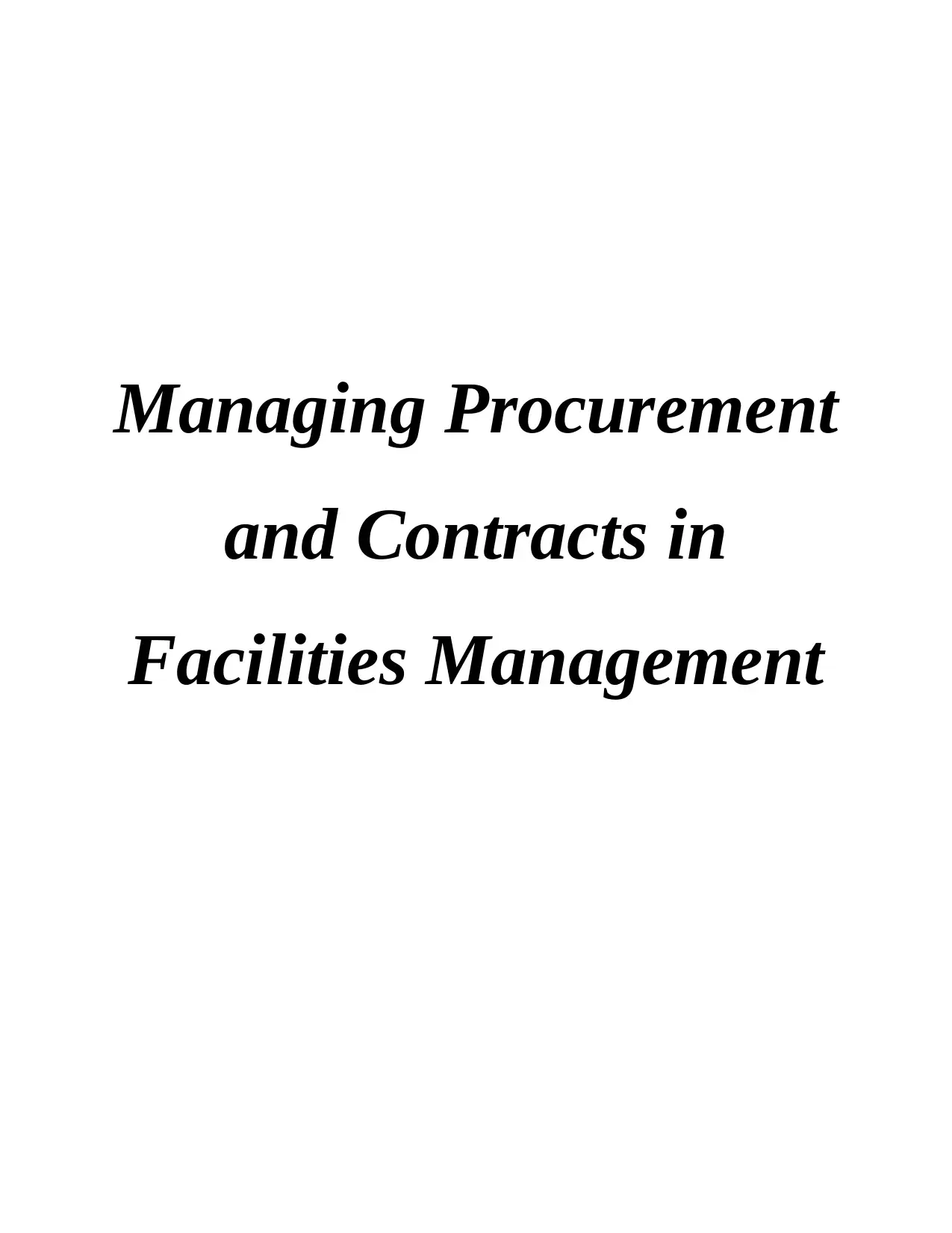
Managing Procurement
and Contracts in
Facilities Management
and Contracts in
Facilities Management
Paraphrase This Document
Need a fresh take? Get an instant paraphrase of this document with our AI Paraphraser
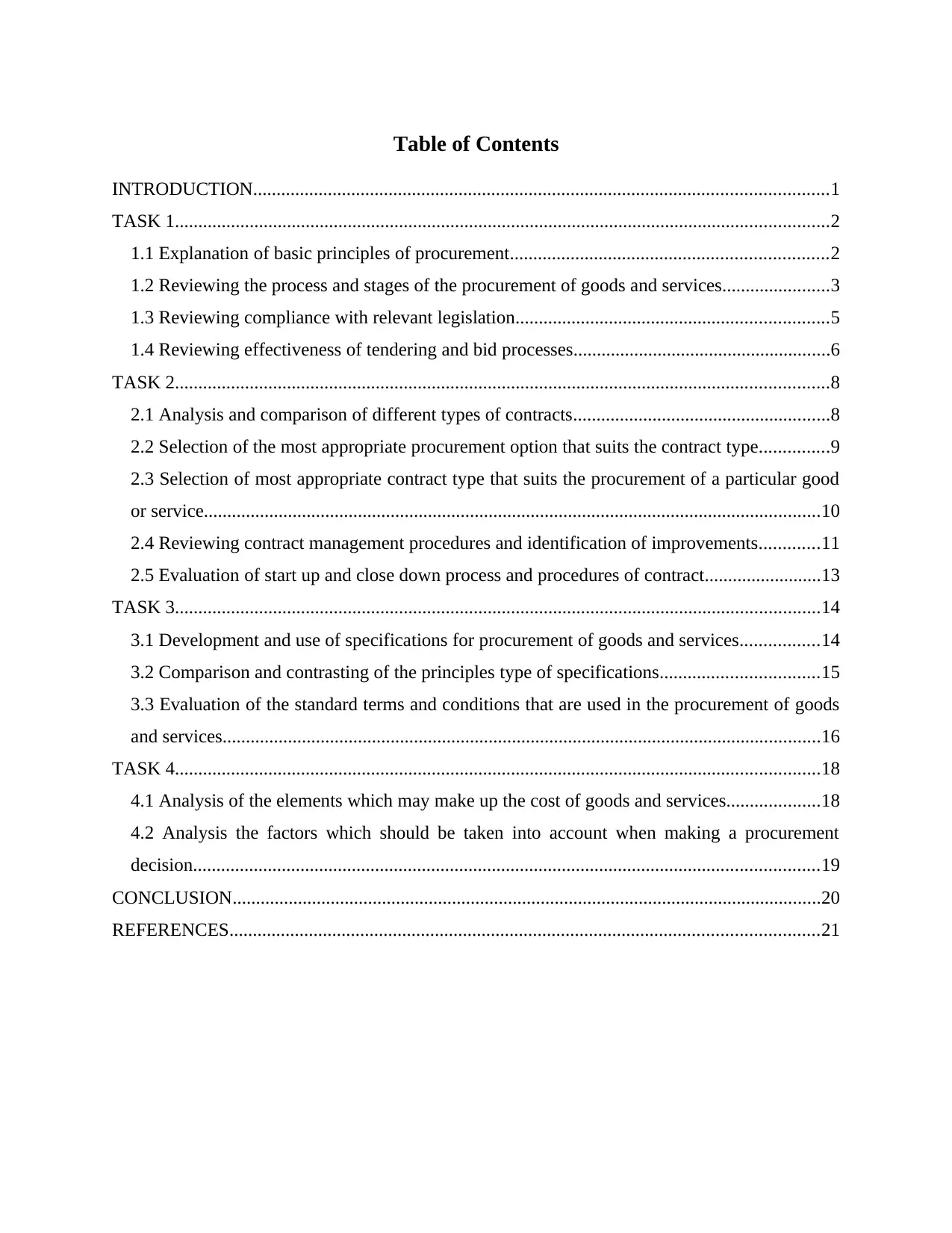
Table of Contents
INTRODUCTION...........................................................................................................................1
TASK 1............................................................................................................................................2
1.1 Explanation of basic principles of procurement....................................................................2
1.2 Reviewing the process and stages of the procurement of goods and services.......................3
1.3 Reviewing compliance with relevant legislation...................................................................5
1.4 Reviewing effectiveness of tendering and bid processes.......................................................6
TASK 2............................................................................................................................................8
2.1 Analysis and comparison of different types of contracts.......................................................8
2.2 Selection of the most appropriate procurement option that suits the contract type...............9
2.3 Selection of most appropriate contract type that suits the procurement of a particular good
or service....................................................................................................................................10
2.4 Reviewing contract management procedures and identification of improvements.............11
2.5 Evaluation of start up and close down process and procedures of contract.........................13
TASK 3..........................................................................................................................................14
3.1 Development and use of specifications for procurement of goods and services.................14
3.2 Comparison and contrasting of the principles type of specifications..................................15
3.3 Evaluation of the standard terms and conditions that are used in the procurement of goods
and services................................................................................................................................16
TASK 4..........................................................................................................................................18
4.1 Analysis of the elements which may make up the cost of goods and services....................18
4.2 Analysis the factors which should be taken into account when making a procurement
decision......................................................................................................................................19
CONCLUSION..............................................................................................................................20
REFERENCES..............................................................................................................................21
INTRODUCTION...........................................................................................................................1
TASK 1............................................................................................................................................2
1.1 Explanation of basic principles of procurement....................................................................2
1.2 Reviewing the process and stages of the procurement of goods and services.......................3
1.3 Reviewing compliance with relevant legislation...................................................................5
1.4 Reviewing effectiveness of tendering and bid processes.......................................................6
TASK 2............................................................................................................................................8
2.1 Analysis and comparison of different types of contracts.......................................................8
2.2 Selection of the most appropriate procurement option that suits the contract type...............9
2.3 Selection of most appropriate contract type that suits the procurement of a particular good
or service....................................................................................................................................10
2.4 Reviewing contract management procedures and identification of improvements.............11
2.5 Evaluation of start up and close down process and procedures of contract.........................13
TASK 3..........................................................................................................................................14
3.1 Development and use of specifications for procurement of goods and services.................14
3.2 Comparison and contrasting of the principles type of specifications..................................15
3.3 Evaluation of the standard terms and conditions that are used in the procurement of goods
and services................................................................................................................................16
TASK 4..........................................................................................................................................18
4.1 Analysis of the elements which may make up the cost of goods and services....................18
4.2 Analysis the factors which should be taken into account when making a procurement
decision......................................................................................................................................19
CONCLUSION..............................................................................................................................20
REFERENCES..............................................................................................................................21
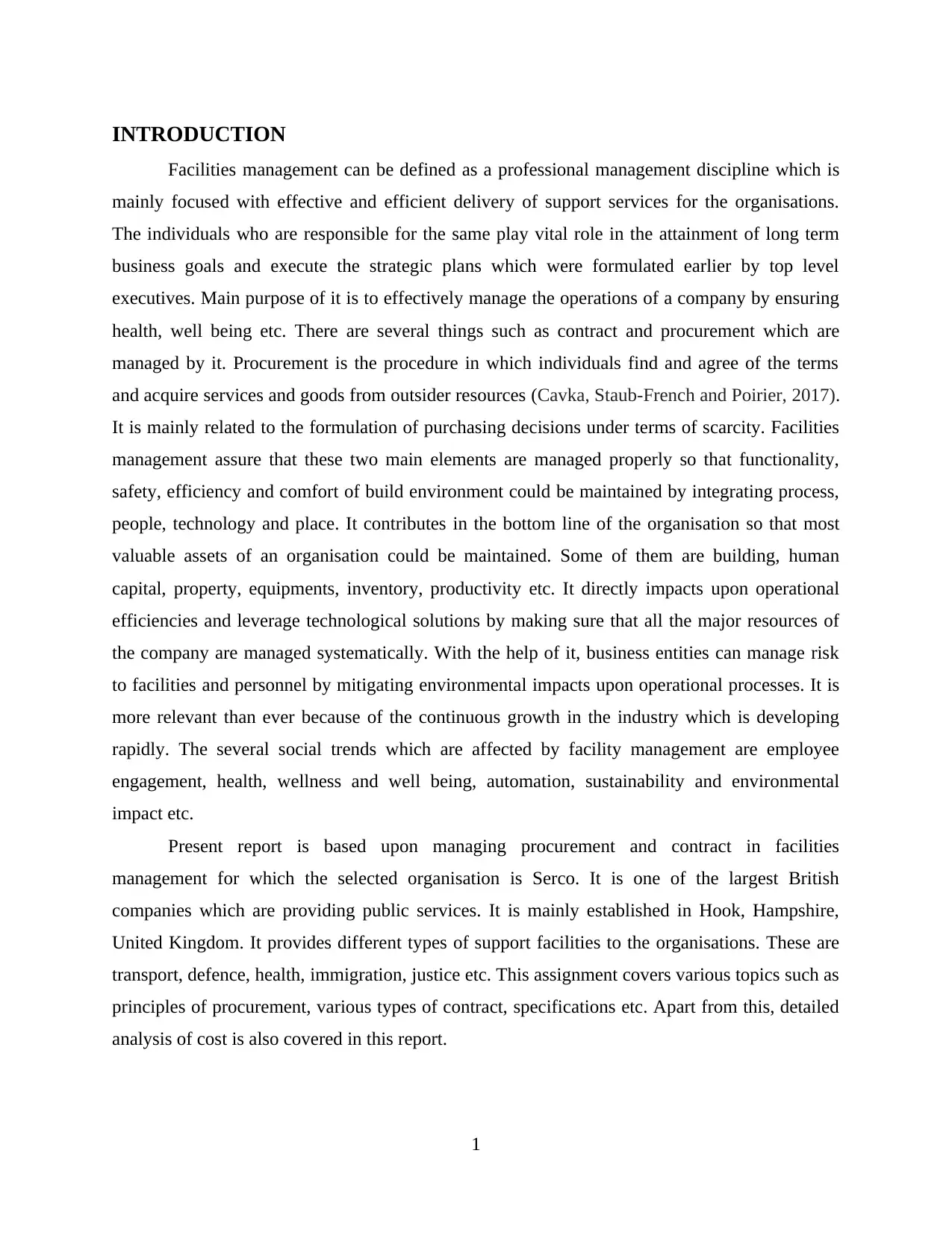
INTRODUCTION
Facilities management can be defined as a professional management discipline which is
mainly focused with effective and efficient delivery of support services for the organisations.
The individuals who are responsible for the same play vital role in the attainment of long term
business goals and execute the strategic plans which were formulated earlier by top level
executives. Main purpose of it is to effectively manage the operations of a company by ensuring
health, well being etc. There are several things such as contract and procurement which are
managed by it. Procurement is the procedure in which individuals find and agree of the terms
and acquire services and goods from outsider resources (Cavka, Staub-French and Poirier, 2017).
It is mainly related to the formulation of purchasing decisions under terms of scarcity. Facilities
management assure that these two main elements are managed properly so that functionality,
safety, efficiency and comfort of build environment could be maintained by integrating process,
people, technology and place. It contributes in the bottom line of the organisation so that most
valuable assets of an organisation could be maintained. Some of them are building, human
capital, property, equipments, inventory, productivity etc. It directly impacts upon operational
efficiencies and leverage technological solutions by making sure that all the major resources of
the company are managed systematically. With the help of it, business entities can manage risk
to facilities and personnel by mitigating environmental impacts upon operational processes. It is
more relevant than ever because of the continuous growth in the industry which is developing
rapidly. The several social trends which are affected by facility management are employee
engagement, health, wellness and well being, automation, sustainability and environmental
impact etc.
Present report is based upon managing procurement and contract in facilities
management for which the selected organisation is Serco. It is one of the largest British
companies which are providing public services. It is mainly established in Hook, Hampshire,
United Kingdom. It provides different types of support facilities to the organisations. These are
transport, defence, health, immigration, justice etc. This assignment covers various topics such as
principles of procurement, various types of contract, specifications etc. Apart from this, detailed
analysis of cost is also covered in this report.
1
Facilities management can be defined as a professional management discipline which is
mainly focused with effective and efficient delivery of support services for the organisations.
The individuals who are responsible for the same play vital role in the attainment of long term
business goals and execute the strategic plans which were formulated earlier by top level
executives. Main purpose of it is to effectively manage the operations of a company by ensuring
health, well being etc. There are several things such as contract and procurement which are
managed by it. Procurement is the procedure in which individuals find and agree of the terms
and acquire services and goods from outsider resources (Cavka, Staub-French and Poirier, 2017).
It is mainly related to the formulation of purchasing decisions under terms of scarcity. Facilities
management assure that these two main elements are managed properly so that functionality,
safety, efficiency and comfort of build environment could be maintained by integrating process,
people, technology and place. It contributes in the bottom line of the organisation so that most
valuable assets of an organisation could be maintained. Some of them are building, human
capital, property, equipments, inventory, productivity etc. It directly impacts upon operational
efficiencies and leverage technological solutions by making sure that all the major resources of
the company are managed systematically. With the help of it, business entities can manage risk
to facilities and personnel by mitigating environmental impacts upon operational processes. It is
more relevant than ever because of the continuous growth in the industry which is developing
rapidly. The several social trends which are affected by facility management are employee
engagement, health, wellness and well being, automation, sustainability and environmental
impact etc.
Present report is based upon managing procurement and contract in facilities
management for which the selected organisation is Serco. It is one of the largest British
companies which are providing public services. It is mainly established in Hook, Hampshire,
United Kingdom. It provides different types of support facilities to the organisations. These are
transport, defence, health, immigration, justice etc. This assignment covers various topics such as
principles of procurement, various types of contract, specifications etc. Apart from this, detailed
analysis of cost is also covered in this report.
1
⊘ This is a preview!⊘
Do you want full access?
Subscribe today to unlock all pages.

Trusted by 1+ million students worldwide
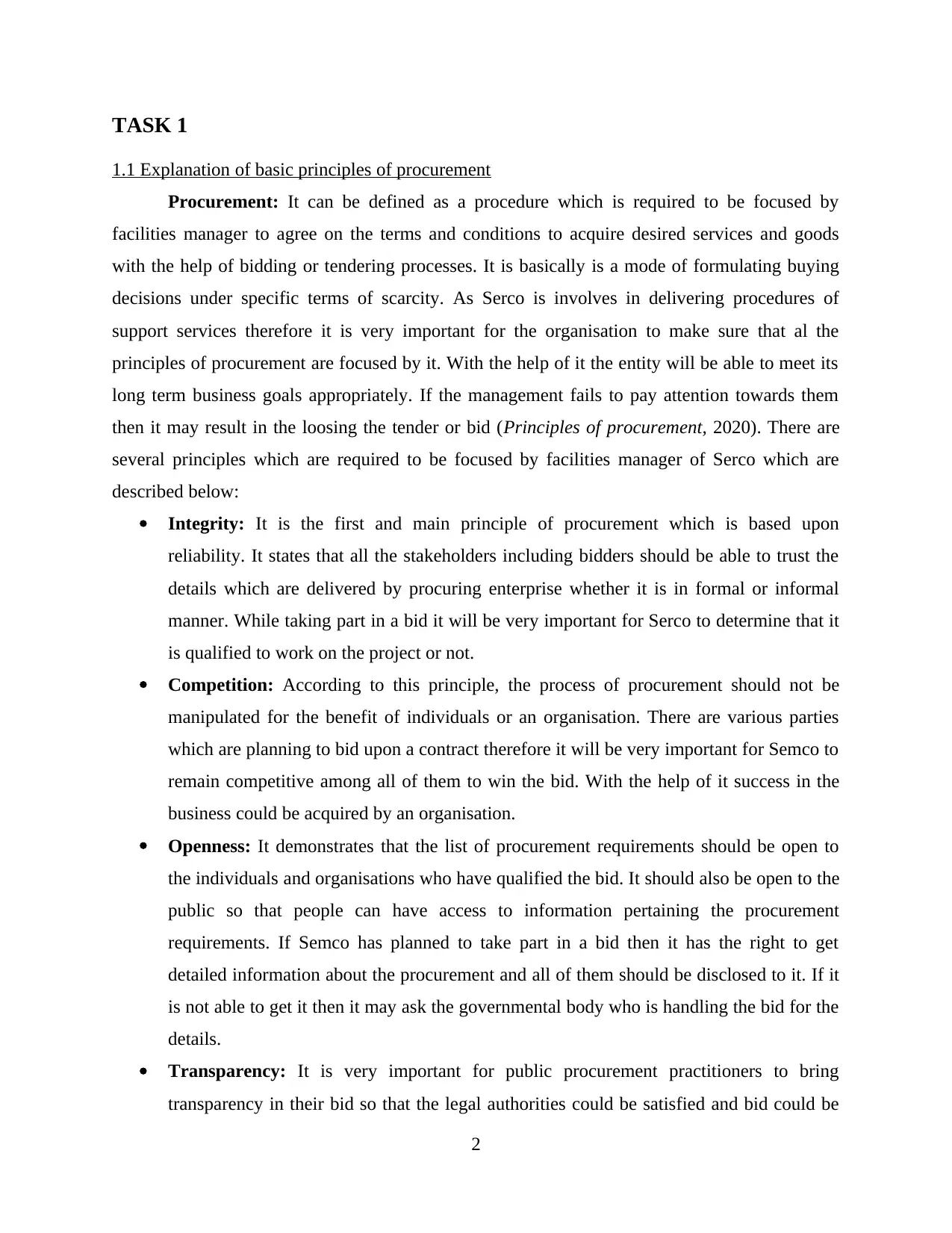
TASK 1
1.1 Explanation of basic principles of procurement
Procurement: It can be defined as a procedure which is required to be focused by
facilities manager to agree on the terms and conditions to acquire desired services and goods
with the help of bidding or tendering processes. It is basically is a mode of formulating buying
decisions under specific terms of scarcity. As Serco is involves in delivering procedures of
support services therefore it is very important for the organisation to make sure that al the
principles of procurement are focused by it. With the help of it the entity will be able to meet its
long term business goals appropriately. If the management fails to pay attention towards them
then it may result in the loosing the tender or bid (Principles of procurement, 2020). There are
several principles which are required to be focused by facilities manager of Serco which are
described below:
Integrity: It is the first and main principle of procurement which is based upon
reliability. It states that all the stakeholders including bidders should be able to trust the
details which are delivered by procuring enterprise whether it is in formal or informal
manner. While taking part in a bid it will be very important for Serco to determine that it
is qualified to work on the project or not.
Competition: According to this principle, the process of procurement should not be
manipulated for the benefit of individuals or an organisation. There are various parties
which are planning to bid upon a contract therefore it will be very important for Semco to
remain competitive among all of them to win the bid. With the help of it success in the
business could be acquired by an organisation.
Openness: It demonstrates that the list of procurement requirements should be open to
the individuals and organisations who have qualified the bid. It should also be open to the
public so that people can have access to information pertaining the procurement
requirements. If Semco has planned to take part in a bid then it has the right to get
detailed information about the procurement and all of them should be disclosed to it. If it
is not able to get it then it may ask the governmental body who is handling the bid for the
details.
Transparency: It is very important for public procurement practitioners to bring
transparency in their bid so that the legal authorities could be satisfied and bid could be
2
1.1 Explanation of basic principles of procurement
Procurement: It can be defined as a procedure which is required to be focused by
facilities manager to agree on the terms and conditions to acquire desired services and goods
with the help of bidding or tendering processes. It is basically is a mode of formulating buying
decisions under specific terms of scarcity. As Serco is involves in delivering procedures of
support services therefore it is very important for the organisation to make sure that al the
principles of procurement are focused by it. With the help of it the entity will be able to meet its
long term business goals appropriately. If the management fails to pay attention towards them
then it may result in the loosing the tender or bid (Principles of procurement, 2020). There are
several principles which are required to be focused by facilities manager of Serco which are
described below:
Integrity: It is the first and main principle of procurement which is based upon
reliability. It states that all the stakeholders including bidders should be able to trust the
details which are delivered by procuring enterprise whether it is in formal or informal
manner. While taking part in a bid it will be very important for Serco to determine that it
is qualified to work on the project or not.
Competition: According to this principle, the process of procurement should not be
manipulated for the benefit of individuals or an organisation. There are various parties
which are planning to bid upon a contract therefore it will be very important for Semco to
remain competitive among all of them to win the bid. With the help of it success in the
business could be acquired by an organisation.
Openness: It demonstrates that the list of procurement requirements should be open to
the individuals and organisations who have qualified the bid. It should also be open to the
public so that people can have access to information pertaining the procurement
requirements. If Semco has planned to take part in a bid then it has the right to get
detailed information about the procurement and all of them should be disclosed to it. If it
is not able to get it then it may ask the governmental body who is handling the bid for the
details.
Transparency: It is very important for public procurement practitioners to bring
transparency in their bid so that the legal authorities could be satisfied and bid could be
2
Paraphrase This Document
Need a fresh take? Get an instant paraphrase of this document with our AI Paraphraser
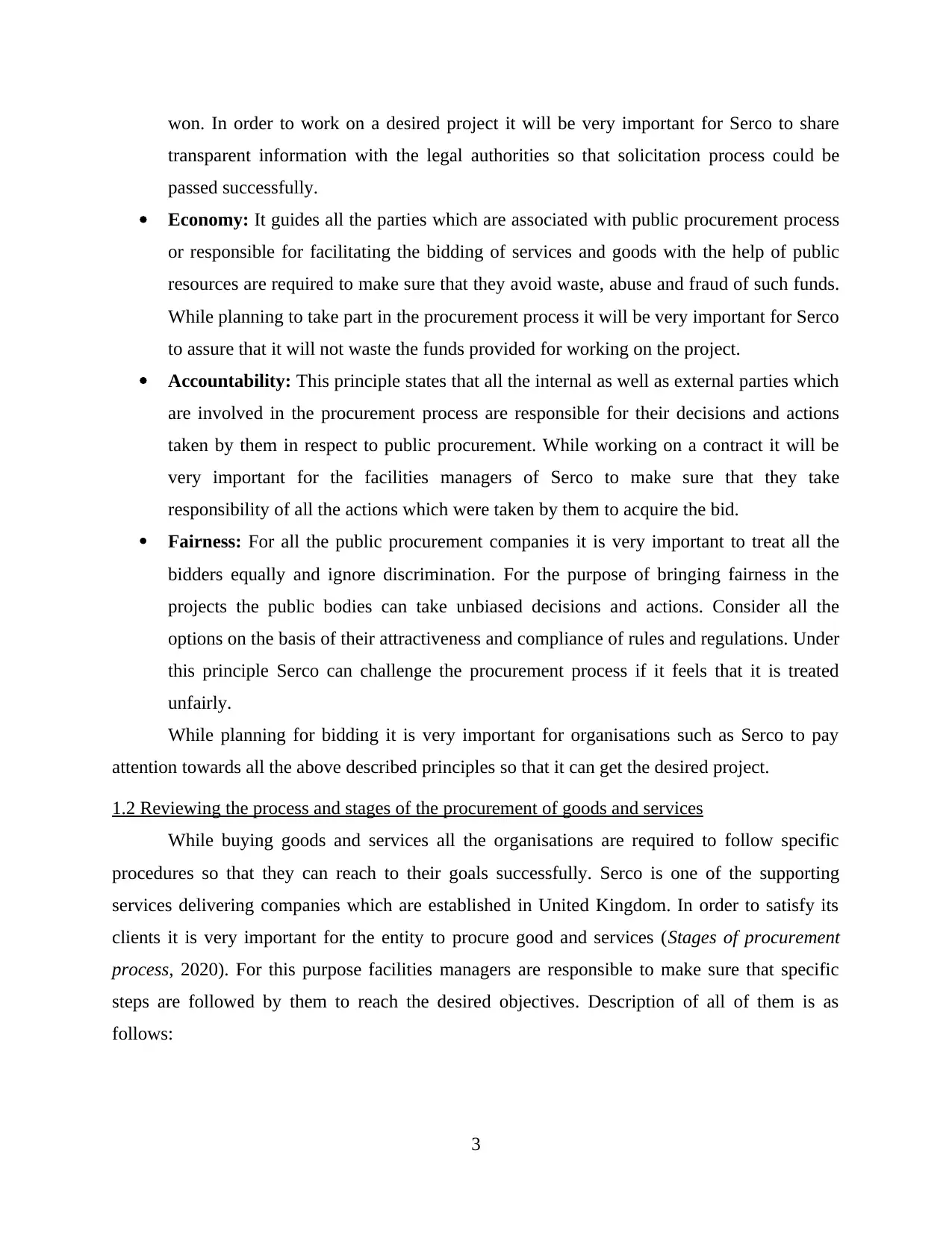
won. In order to work on a desired project it will be very important for Serco to share
transparent information with the legal authorities so that solicitation process could be
passed successfully.
Economy: It guides all the parties which are associated with public procurement process
or responsible for facilitating the bidding of services and goods with the help of public
resources are required to make sure that they avoid waste, abuse and fraud of such funds.
While planning to take part in the procurement process it will be very important for Serco
to assure that it will not waste the funds provided for working on the project.
Accountability: This principle states that all the internal as well as external parties which
are involved in the procurement process are responsible for their decisions and actions
taken by them in respect to public procurement. While working on a contract it will be
very important for the facilities managers of Serco to make sure that they take
responsibility of all the actions which were taken by them to acquire the bid.
Fairness: For all the public procurement companies it is very important to treat all the
bidders equally and ignore discrimination. For the purpose of bringing fairness in the
projects the public bodies can take unbiased decisions and actions. Consider all the
options on the basis of their attractiveness and compliance of rules and regulations. Under
this principle Serco can challenge the procurement process if it feels that it is treated
unfairly.
While planning for bidding it is very important for organisations such as Serco to pay
attention towards all the above described principles so that it can get the desired project.
1.2 Reviewing the process and stages of the procurement of goods and services
While buying goods and services all the organisations are required to follow specific
procedures so that they can reach to their goals successfully. Serco is one of the supporting
services delivering companies which are established in United Kingdom. In order to satisfy its
clients it is very important for the entity to procure good and services (Stages of procurement
process, 2020). For this purpose facilities managers are responsible to make sure that specific
steps are followed by them to reach the desired objectives. Description of all of them is as
follows:
3
transparent information with the legal authorities so that solicitation process could be
passed successfully.
Economy: It guides all the parties which are associated with public procurement process
or responsible for facilitating the bidding of services and goods with the help of public
resources are required to make sure that they avoid waste, abuse and fraud of such funds.
While planning to take part in the procurement process it will be very important for Serco
to assure that it will not waste the funds provided for working on the project.
Accountability: This principle states that all the internal as well as external parties which
are involved in the procurement process are responsible for their decisions and actions
taken by them in respect to public procurement. While working on a contract it will be
very important for the facilities managers of Serco to make sure that they take
responsibility of all the actions which were taken by them to acquire the bid.
Fairness: For all the public procurement companies it is very important to treat all the
bidders equally and ignore discrimination. For the purpose of bringing fairness in the
projects the public bodies can take unbiased decisions and actions. Consider all the
options on the basis of their attractiveness and compliance of rules and regulations. Under
this principle Serco can challenge the procurement process if it feels that it is treated
unfairly.
While planning for bidding it is very important for organisations such as Serco to pay
attention towards all the above described principles so that it can get the desired project.
1.2 Reviewing the process and stages of the procurement of goods and services
While buying goods and services all the organisations are required to follow specific
procedures so that they can reach to their goals successfully. Serco is one of the supporting
services delivering companies which are established in United Kingdom. In order to satisfy its
clients it is very important for the entity to procure good and services (Stages of procurement
process, 2020). For this purpose facilities managers are responsible to make sure that specific
steps are followed by them to reach the desired objectives. Description of all of them is as
follows:
3
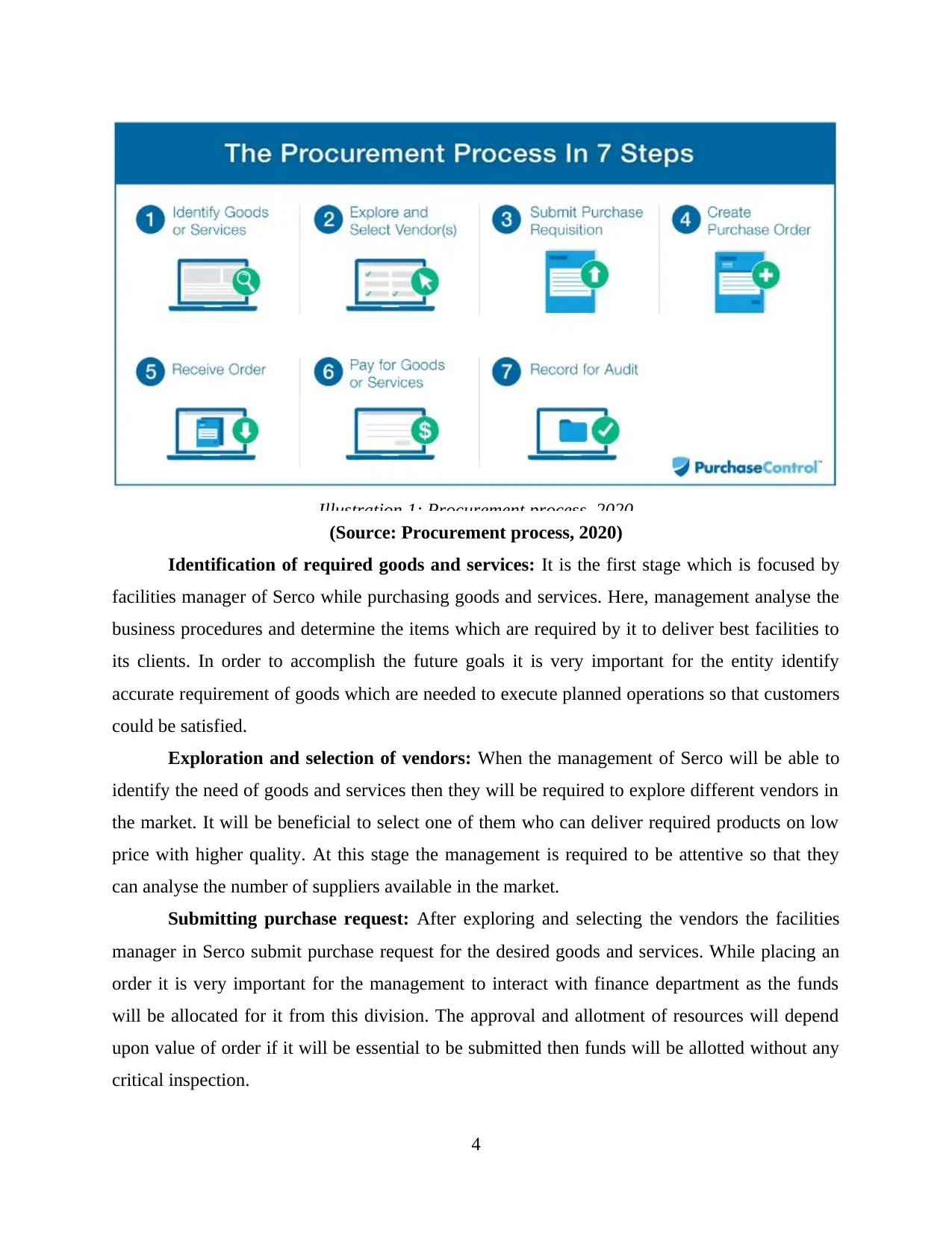
Illustration 1: Procurement process, 2020
(Source: Procurement process, 2020)
Identification of required goods and services: It is the first stage which is focused by
facilities manager of Serco while purchasing goods and services. Here, management analyse the
business procedures and determine the items which are required by it to deliver best facilities to
its clients. In order to accomplish the future goals it is very important for the entity identify
accurate requirement of goods which are needed to execute planned operations so that customers
could be satisfied.
Exploration and selection of vendors: When the management of Serco will be able to
identify the need of goods and services then they will be required to explore different vendors in
the market. It will be beneficial to select one of them who can deliver required products on low
price with higher quality. At this stage the management is required to be attentive so that they
can analyse the number of suppliers available in the market.
Submitting purchase request: After exploring and selecting the vendors the facilities
manager in Serco submit purchase request for the desired goods and services. While placing an
order it is very important for the management to interact with finance department as the funds
will be allocated for it from this division. The approval and allotment of resources will depend
upon value of order if it will be essential to be submitted then funds will be allotted without any
critical inspection.
4
(Source: Procurement process, 2020)
Identification of required goods and services: It is the first stage which is focused by
facilities manager of Serco while purchasing goods and services. Here, management analyse the
business procedures and determine the items which are required by it to deliver best facilities to
its clients. In order to accomplish the future goals it is very important for the entity identify
accurate requirement of goods which are needed to execute planned operations so that customers
could be satisfied.
Exploration and selection of vendors: When the management of Serco will be able to
identify the need of goods and services then they will be required to explore different vendors in
the market. It will be beneficial to select one of them who can deliver required products on low
price with higher quality. At this stage the management is required to be attentive so that they
can analyse the number of suppliers available in the market.
Submitting purchase request: After exploring and selecting the vendors the facilities
manager in Serco submit purchase request for the desired goods and services. While placing an
order it is very important for the management to interact with finance department as the funds
will be allocated for it from this division. The approval and allotment of resources will depend
upon value of order if it will be essential to be submitted then funds will be allotted without any
critical inspection.
4
⊘ This is a preview!⊘
Do you want full access?
Subscribe today to unlock all pages.

Trusted by 1+ million students worldwide
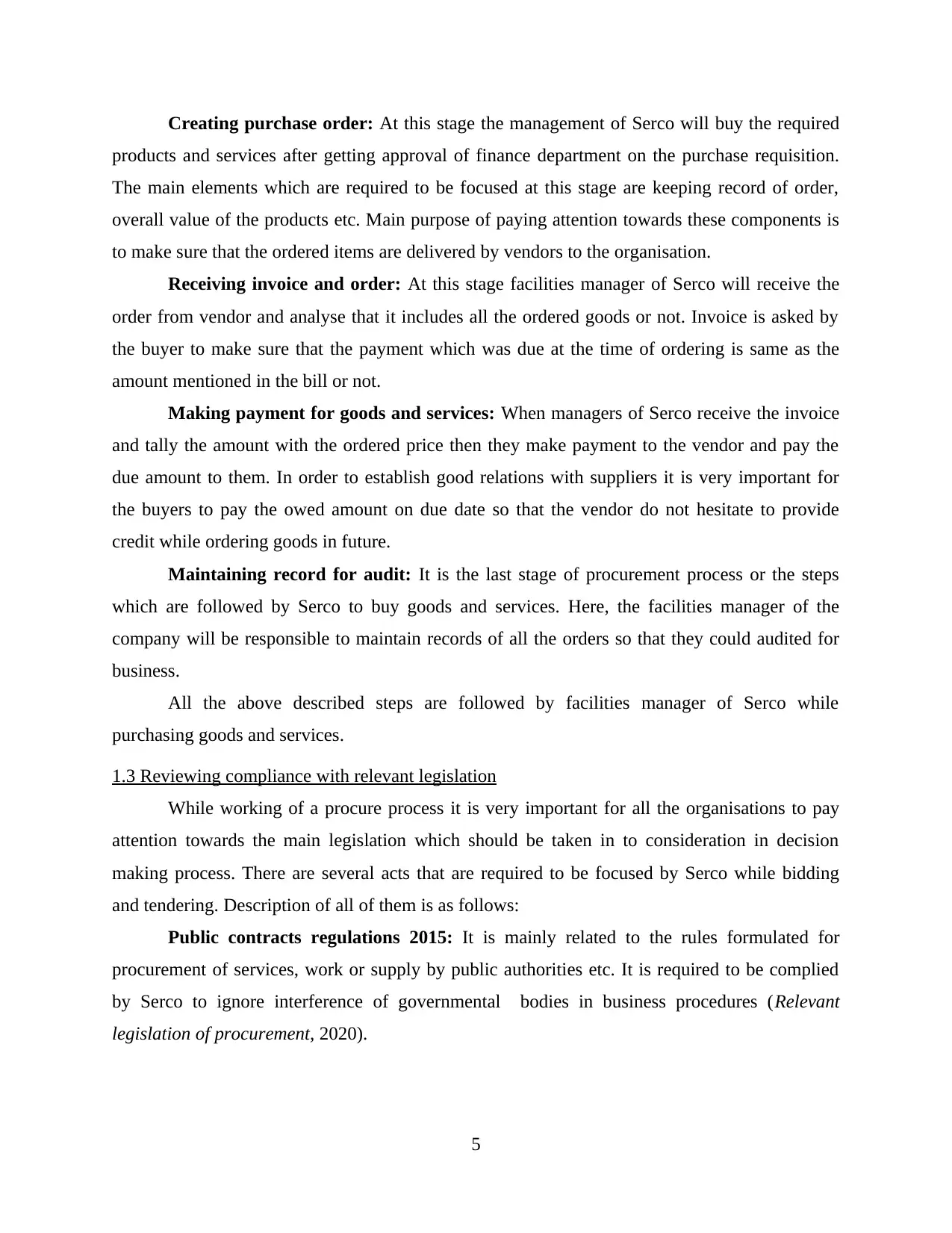
Creating purchase order: At this stage the management of Serco will buy the required
products and services after getting approval of finance department on the purchase requisition.
The main elements which are required to be focused at this stage are keeping record of order,
overall value of the products etc. Main purpose of paying attention towards these components is
to make sure that the ordered items are delivered by vendors to the organisation.
Receiving invoice and order: At this stage facilities manager of Serco will receive the
order from vendor and analyse that it includes all the ordered goods or not. Invoice is asked by
the buyer to make sure that the payment which was due at the time of ordering is same as the
amount mentioned in the bill or not.
Making payment for goods and services: When managers of Serco receive the invoice
and tally the amount with the ordered price then they make payment to the vendor and pay the
due amount to them. In order to establish good relations with suppliers it is very important for
the buyers to pay the owed amount on due date so that the vendor do not hesitate to provide
credit while ordering goods in future.
Maintaining record for audit: It is the last stage of procurement process or the steps
which are followed by Serco to buy goods and services. Here, the facilities manager of the
company will be responsible to maintain records of all the orders so that they could audited for
business.
All the above described steps are followed by facilities manager of Serco while
purchasing goods and services.
1.3 Reviewing compliance with relevant legislation
While working of a procure process it is very important for all the organisations to pay
attention towards the main legislation which should be taken in to consideration in decision
making process. There are several acts that are required to be focused by Serco while bidding
and tendering. Description of all of them is as follows:
Public contracts regulations 2015: It is mainly related to the rules formulated for
procurement of services, work or supply by public authorities etc. It is required to be complied
by Serco to ignore interference of governmental bodies in business procedures (Relevant
legislation of procurement, 2020).
5
products and services after getting approval of finance department on the purchase requisition.
The main elements which are required to be focused at this stage are keeping record of order,
overall value of the products etc. Main purpose of paying attention towards these components is
to make sure that the ordered items are delivered by vendors to the organisation.
Receiving invoice and order: At this stage facilities manager of Serco will receive the
order from vendor and analyse that it includes all the ordered goods or not. Invoice is asked by
the buyer to make sure that the payment which was due at the time of ordering is same as the
amount mentioned in the bill or not.
Making payment for goods and services: When managers of Serco receive the invoice
and tally the amount with the ordered price then they make payment to the vendor and pay the
due amount to them. In order to establish good relations with suppliers it is very important for
the buyers to pay the owed amount on due date so that the vendor do not hesitate to provide
credit while ordering goods in future.
Maintaining record for audit: It is the last stage of procurement process or the steps
which are followed by Serco to buy goods and services. Here, the facilities manager of the
company will be responsible to maintain records of all the orders so that they could audited for
business.
All the above described steps are followed by facilities manager of Serco while
purchasing goods and services.
1.3 Reviewing compliance with relevant legislation
While working of a procure process it is very important for all the organisations to pay
attention towards the main legislation which should be taken in to consideration in decision
making process. There are several acts that are required to be focused by Serco while bidding
and tendering. Description of all of them is as follows:
Public contracts regulations 2015: It is mainly related to the rules formulated for
procurement of services, work or supply by public authorities etc. It is required to be complied
by Serco to ignore interference of governmental bodies in business procedures (Relevant
legislation of procurement, 2020).
5
Paraphrase This Document
Need a fresh take? Get an instant paraphrase of this document with our AI Paraphraser
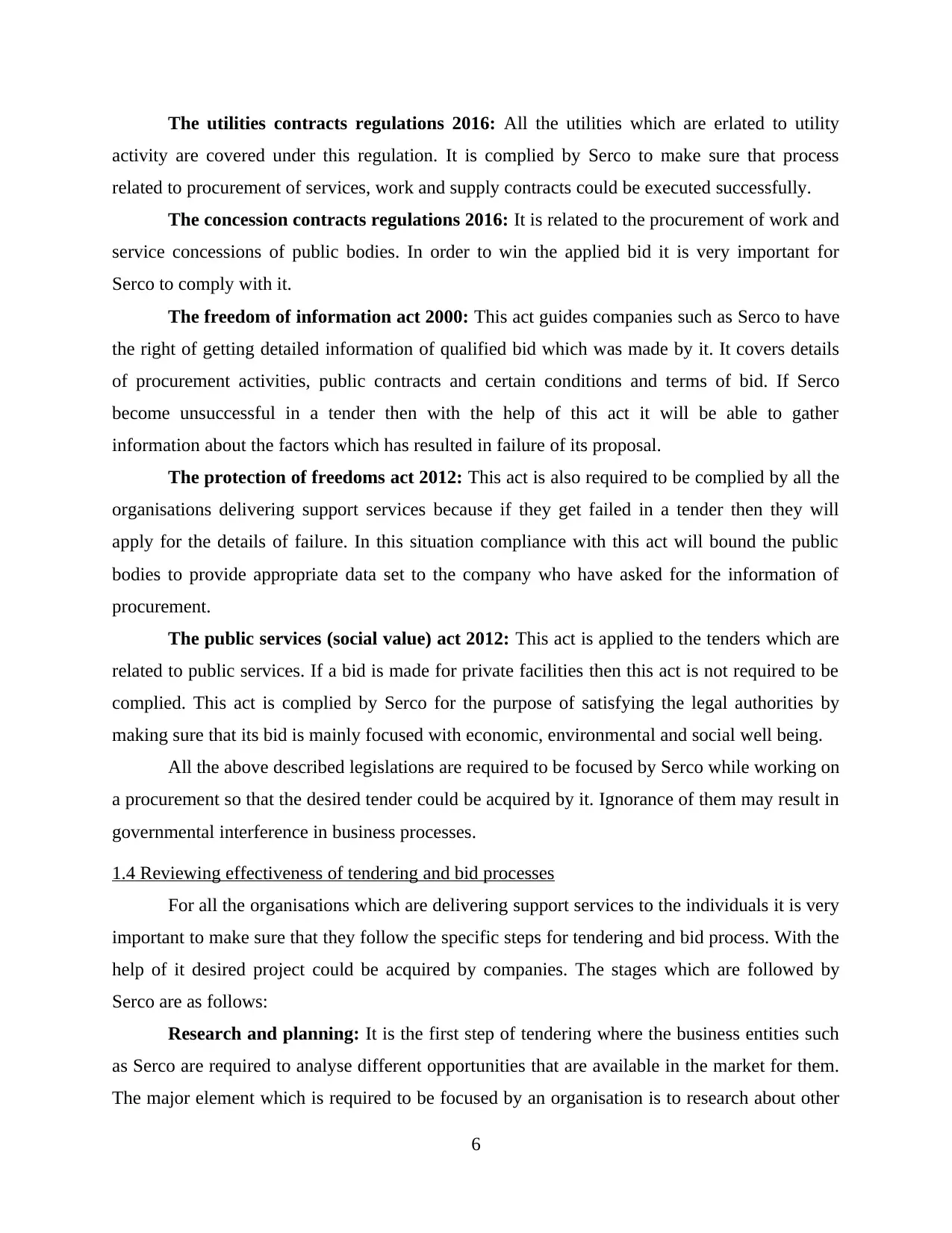
The utilities contracts regulations 2016: All the utilities which are erlated to utility
activity are covered under this regulation. It is complied by Serco to make sure that process
related to procurement of services, work and supply contracts could be executed successfully.
The concession contracts regulations 2016: It is related to the procurement of work and
service concessions of public bodies. In order to win the applied bid it is very important for
Serco to comply with it.
The freedom of information act 2000: This act guides companies such as Serco to have
the right of getting detailed information of qualified bid which was made by it. It covers details
of procurement activities, public contracts and certain conditions and terms of bid. If Serco
become unsuccessful in a tender then with the help of this act it will be able to gather
information about the factors which has resulted in failure of its proposal.
The protection of freedoms act 2012: This act is also required to be complied by all the
organisations delivering support services because if they get failed in a tender then they will
apply for the details of failure. In this situation compliance with this act will bound the public
bodies to provide appropriate data set to the company who have asked for the information of
procurement.
The public services (social value) act 2012: This act is applied to the tenders which are
related to public services. If a bid is made for private facilities then this act is not required to be
complied. This act is complied by Serco for the purpose of satisfying the legal authorities by
making sure that its bid is mainly focused with economic, environmental and social well being.
All the above described legislations are required to be focused by Serco while working on
a procurement so that the desired tender could be acquired by it. Ignorance of them may result in
governmental interference in business processes.
1.4 Reviewing effectiveness of tendering and bid processes
For all the organisations which are delivering support services to the individuals it is very
important to make sure that they follow the specific steps for tendering and bid process. With the
help of it desired project could be acquired by companies. The stages which are followed by
Serco are as follows:
Research and planning: It is the first step of tendering where the business entities such
as Serco are required to analyse different opportunities that are available in the market for them.
The major element which is required to be focused by an organisation is to research about other
6
activity are covered under this regulation. It is complied by Serco to make sure that process
related to procurement of services, work and supply contracts could be executed successfully.
The concession contracts regulations 2016: It is related to the procurement of work and
service concessions of public bodies. In order to win the applied bid it is very important for
Serco to comply with it.
The freedom of information act 2000: This act guides companies such as Serco to have
the right of getting detailed information of qualified bid which was made by it. It covers details
of procurement activities, public contracts and certain conditions and terms of bid. If Serco
become unsuccessful in a tender then with the help of this act it will be able to gather
information about the factors which has resulted in failure of its proposal.
The protection of freedoms act 2012: This act is also required to be complied by all the
organisations delivering support services because if they get failed in a tender then they will
apply for the details of failure. In this situation compliance with this act will bound the public
bodies to provide appropriate data set to the company who have asked for the information of
procurement.
The public services (social value) act 2012: This act is applied to the tenders which are
related to public services. If a bid is made for private facilities then this act is not required to be
complied. This act is complied by Serco for the purpose of satisfying the legal authorities by
making sure that its bid is mainly focused with economic, environmental and social well being.
All the above described legislations are required to be focused by Serco while working on
a procurement so that the desired tender could be acquired by it. Ignorance of them may result in
governmental interference in business processes.
1.4 Reviewing effectiveness of tendering and bid processes
For all the organisations which are delivering support services to the individuals it is very
important to make sure that they follow the specific steps for tendering and bid process. With the
help of it desired project could be acquired by companies. The stages which are followed by
Serco are as follows:
Research and planning: It is the first step of tendering where the business entities such
as Serco are required to analyse different opportunities that are available in the market for them.
The major element which is required to be focused by an organisation is to research about other
6
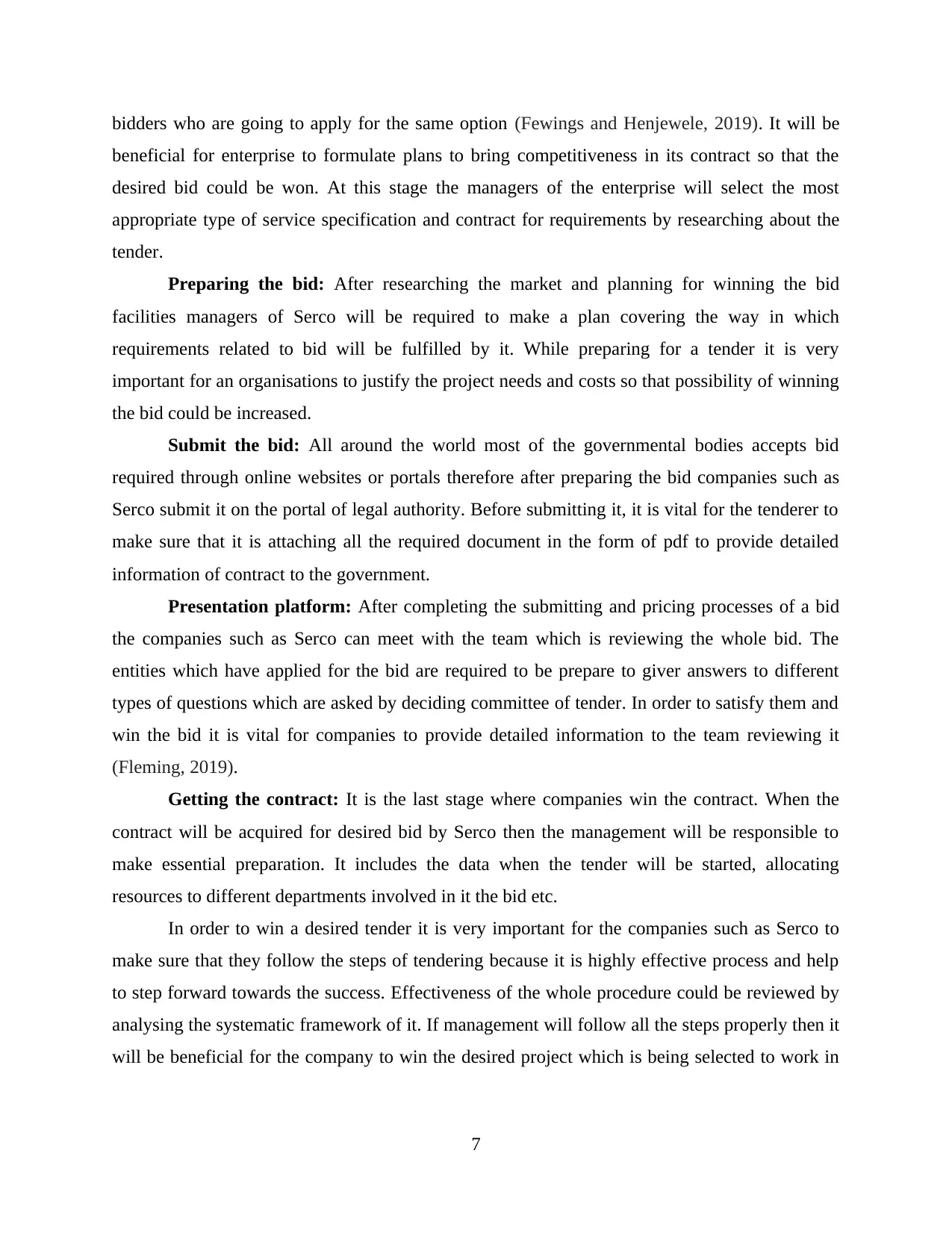
bidders who are going to apply for the same option (Fewings and Henjewele, 2019). It will be
beneficial for enterprise to formulate plans to bring competitiveness in its contract so that the
desired bid could be won. At this stage the managers of the enterprise will select the most
appropriate type of service specification and contract for requirements by researching about the
tender.
Preparing the bid: After researching the market and planning for winning the bid
facilities managers of Serco will be required to make a plan covering the way in which
requirements related to bid will be fulfilled by it. While preparing for a tender it is very
important for an organisations to justify the project needs and costs so that possibility of winning
the bid could be increased.
Submit the bid: All around the world most of the governmental bodies accepts bid
required through online websites or portals therefore after preparing the bid companies such as
Serco submit it on the portal of legal authority. Before submitting it, it is vital for the tenderer to
make sure that it is attaching all the required document in the form of pdf to provide detailed
information of contract to the government.
Presentation platform: After completing the submitting and pricing processes of a bid
the companies such as Serco can meet with the team which is reviewing the whole bid. The
entities which have applied for the bid are required to be prepare to giver answers to different
types of questions which are asked by deciding committee of tender. In order to satisfy them and
win the bid it is vital for companies to provide detailed information to the team reviewing it
(Fleming, 2019).
Getting the contract: It is the last stage where companies win the contract. When the
contract will be acquired for desired bid by Serco then the management will be responsible to
make essential preparation. It includes the data when the tender will be started, allocating
resources to different departments involved in it the bid etc.
In order to win a desired tender it is very important for the companies such as Serco to
make sure that they follow the steps of tendering because it is highly effective process and help
to step forward towards the success. Effectiveness of the whole procedure could be reviewed by
analysing the systematic framework of it. If management will follow all the steps properly then it
will be beneficial for the company to win the desired project which is being selected to work in
7
beneficial for enterprise to formulate plans to bring competitiveness in its contract so that the
desired bid could be won. At this stage the managers of the enterprise will select the most
appropriate type of service specification and contract for requirements by researching about the
tender.
Preparing the bid: After researching the market and planning for winning the bid
facilities managers of Serco will be required to make a plan covering the way in which
requirements related to bid will be fulfilled by it. While preparing for a tender it is very
important for an organisations to justify the project needs and costs so that possibility of winning
the bid could be increased.
Submit the bid: All around the world most of the governmental bodies accepts bid
required through online websites or portals therefore after preparing the bid companies such as
Serco submit it on the portal of legal authority. Before submitting it, it is vital for the tenderer to
make sure that it is attaching all the required document in the form of pdf to provide detailed
information of contract to the government.
Presentation platform: After completing the submitting and pricing processes of a bid
the companies such as Serco can meet with the team which is reviewing the whole bid. The
entities which have applied for the bid are required to be prepare to giver answers to different
types of questions which are asked by deciding committee of tender. In order to satisfy them and
win the bid it is vital for companies to provide detailed information to the team reviewing it
(Fleming, 2019).
Getting the contract: It is the last stage where companies win the contract. When the
contract will be acquired for desired bid by Serco then the management will be responsible to
make essential preparation. It includes the data when the tender will be started, allocating
resources to different departments involved in it the bid etc.
In order to win a desired tender it is very important for the companies such as Serco to
make sure that they follow the steps of tendering because it is highly effective process and help
to step forward towards the success. Effectiveness of the whole procedure could be reviewed by
analysing the systematic framework of it. If management will follow all the steps properly then it
will be beneficial for the company to win the desired project which is being selected to work in
7
⊘ This is a preview!⊘
Do you want full access?
Subscribe today to unlock all pages.

Trusted by 1+ million students worldwide
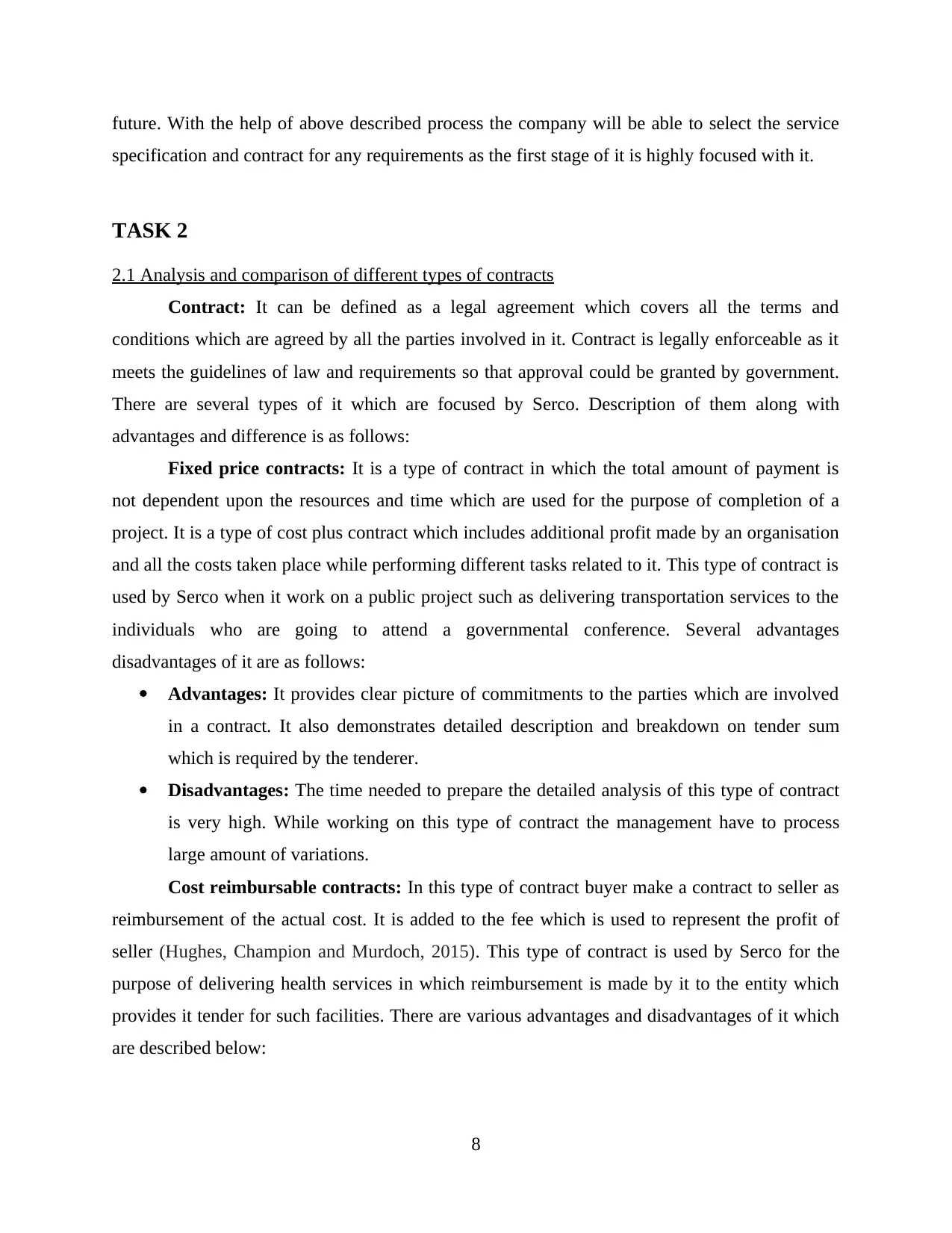
future. With the help of above described process the company will be able to select the service
specification and contract for any requirements as the first stage of it is highly focused with it.
TASK 2
2.1 Analysis and comparison of different types of contracts
Contract: It can be defined as a legal agreement which covers all the terms and
conditions which are agreed by all the parties involved in it. Contract is legally enforceable as it
meets the guidelines of law and requirements so that approval could be granted by government.
There are several types of it which are focused by Serco. Description of them along with
advantages and difference is as follows:
Fixed price contracts: It is a type of contract in which the total amount of payment is
not dependent upon the resources and time which are used for the purpose of completion of a
project. It is a type of cost plus contract which includes additional profit made by an organisation
and all the costs taken place while performing different tasks related to it. This type of contract is
used by Serco when it work on a public project such as delivering transportation services to the
individuals who are going to attend a governmental conference. Several advantages
disadvantages of it are as follows:
Advantages: It provides clear picture of commitments to the parties which are involved
in a contract. It also demonstrates detailed description and breakdown on tender sum
which is required by the tenderer.
Disadvantages: The time needed to prepare the detailed analysis of this type of contract
is very high. While working on this type of contract the management have to process
large amount of variations.
Cost reimbursable contracts: In this type of contract buyer make a contract to seller as
reimbursement of the actual cost. It is added to the fee which is used to represent the profit of
seller (Hughes, Champion and Murdoch, 2015). This type of contract is used by Serco for the
purpose of delivering health services in which reimbursement is made by it to the entity which
provides it tender for such facilities. There are various advantages and disadvantages of it which
are described below:
8
specification and contract for any requirements as the first stage of it is highly focused with it.
TASK 2
2.1 Analysis and comparison of different types of contracts
Contract: It can be defined as a legal agreement which covers all the terms and
conditions which are agreed by all the parties involved in it. Contract is legally enforceable as it
meets the guidelines of law and requirements so that approval could be granted by government.
There are several types of it which are focused by Serco. Description of them along with
advantages and difference is as follows:
Fixed price contracts: It is a type of contract in which the total amount of payment is
not dependent upon the resources and time which are used for the purpose of completion of a
project. It is a type of cost plus contract which includes additional profit made by an organisation
and all the costs taken place while performing different tasks related to it. This type of contract is
used by Serco when it work on a public project such as delivering transportation services to the
individuals who are going to attend a governmental conference. Several advantages
disadvantages of it are as follows:
Advantages: It provides clear picture of commitments to the parties which are involved
in a contract. It also demonstrates detailed description and breakdown on tender sum
which is required by the tenderer.
Disadvantages: The time needed to prepare the detailed analysis of this type of contract
is very high. While working on this type of contract the management have to process
large amount of variations.
Cost reimbursable contracts: In this type of contract buyer make a contract to seller as
reimbursement of the actual cost. It is added to the fee which is used to represent the profit of
seller (Hughes, Champion and Murdoch, 2015). This type of contract is used by Serco for the
purpose of delivering health services in which reimbursement is made by it to the entity which
provides it tender for such facilities. There are various advantages and disadvantages of it which
are described below:
8
Paraphrase This Document
Need a fresh take? Get an instant paraphrase of this document with our AI Paraphraser
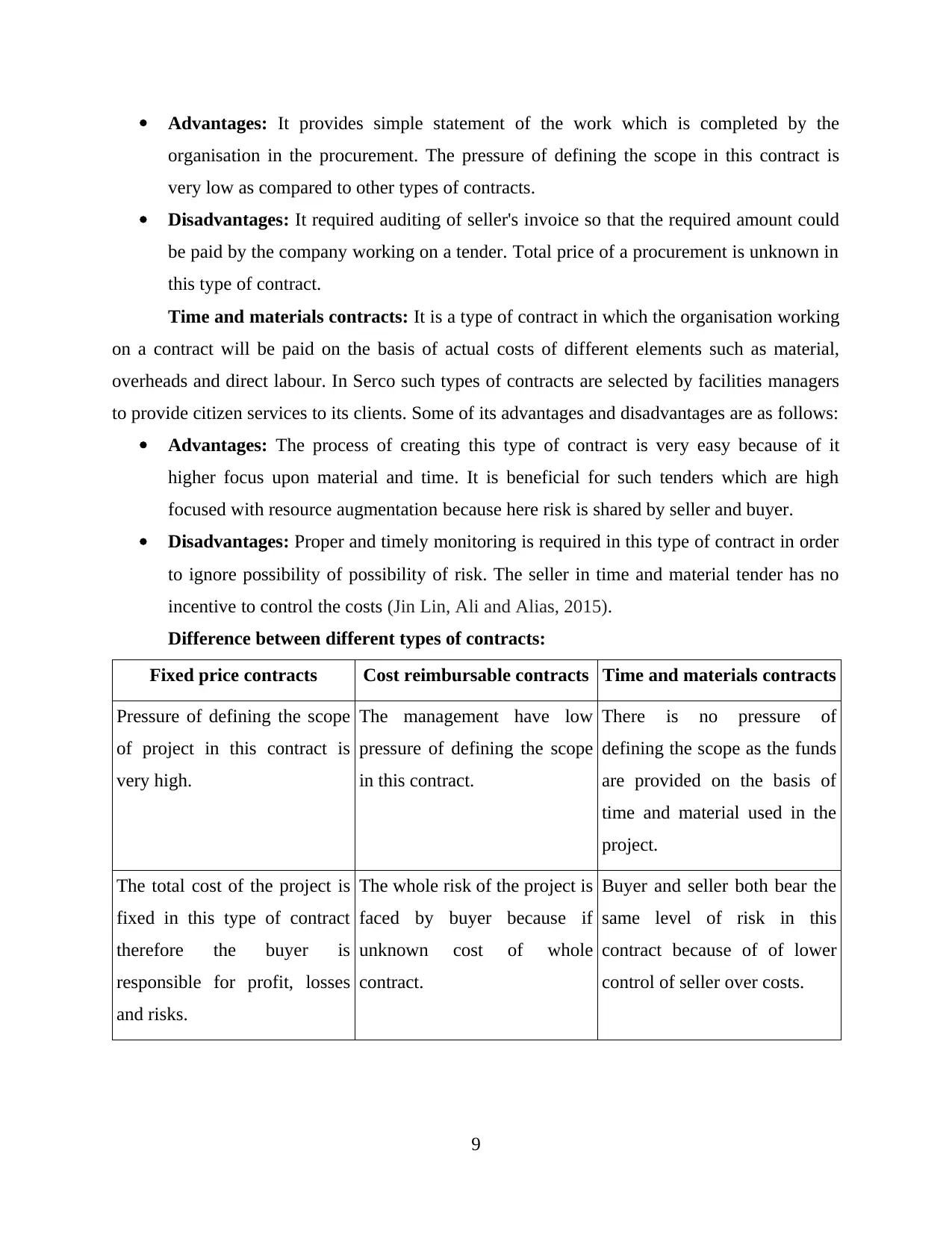
Advantages: It provides simple statement of the work which is completed by the
organisation in the procurement. The pressure of defining the scope in this contract is
very low as compared to other types of contracts.
Disadvantages: It required auditing of seller's invoice so that the required amount could
be paid by the company working on a tender. Total price of a procurement is unknown in
this type of contract.
Time and materials contracts: It is a type of contract in which the organisation working
on a contract will be paid on the basis of actual costs of different elements such as material,
overheads and direct labour. In Serco such types of contracts are selected by facilities managers
to provide citizen services to its clients. Some of its advantages and disadvantages are as follows:
Advantages: The process of creating this type of contract is very easy because of it
higher focus upon material and time. It is beneficial for such tenders which are high
focused with resource augmentation because here risk is shared by seller and buyer.
Disadvantages: Proper and timely monitoring is required in this type of contract in order
to ignore possibility of possibility of risk. The seller in time and material tender has no
incentive to control the costs (Jin Lin, Ali and Alias, 2015).
Difference between different types of contracts:
Fixed price contracts Cost reimbursable contracts Time and materials contracts
Pressure of defining the scope
of project in this contract is
very high.
The management have low
pressure of defining the scope
in this contract.
There is no pressure of
defining the scope as the funds
are provided on the basis of
time and material used in the
project.
The total cost of the project is
fixed in this type of contract
therefore the buyer is
responsible for profit, losses
and risks.
The whole risk of the project is
faced by buyer because if
unknown cost of whole
contract.
Buyer and seller both bear the
same level of risk in this
contract because of of lower
control of seller over costs.
9
organisation in the procurement. The pressure of defining the scope in this contract is
very low as compared to other types of contracts.
Disadvantages: It required auditing of seller's invoice so that the required amount could
be paid by the company working on a tender. Total price of a procurement is unknown in
this type of contract.
Time and materials contracts: It is a type of contract in which the organisation working
on a contract will be paid on the basis of actual costs of different elements such as material,
overheads and direct labour. In Serco such types of contracts are selected by facilities managers
to provide citizen services to its clients. Some of its advantages and disadvantages are as follows:
Advantages: The process of creating this type of contract is very easy because of it
higher focus upon material and time. It is beneficial for such tenders which are high
focused with resource augmentation because here risk is shared by seller and buyer.
Disadvantages: Proper and timely monitoring is required in this type of contract in order
to ignore possibility of possibility of risk. The seller in time and material tender has no
incentive to control the costs (Jin Lin, Ali and Alias, 2015).
Difference between different types of contracts:
Fixed price contracts Cost reimbursable contracts Time and materials contracts
Pressure of defining the scope
of project in this contract is
very high.
The management have low
pressure of defining the scope
in this contract.
There is no pressure of
defining the scope as the funds
are provided on the basis of
time and material used in the
project.
The total cost of the project is
fixed in this type of contract
therefore the buyer is
responsible for profit, losses
and risks.
The whole risk of the project is
faced by buyer because if
unknown cost of whole
contract.
Buyer and seller both bear the
same level of risk in this
contract because of of lower
control of seller over costs.
9
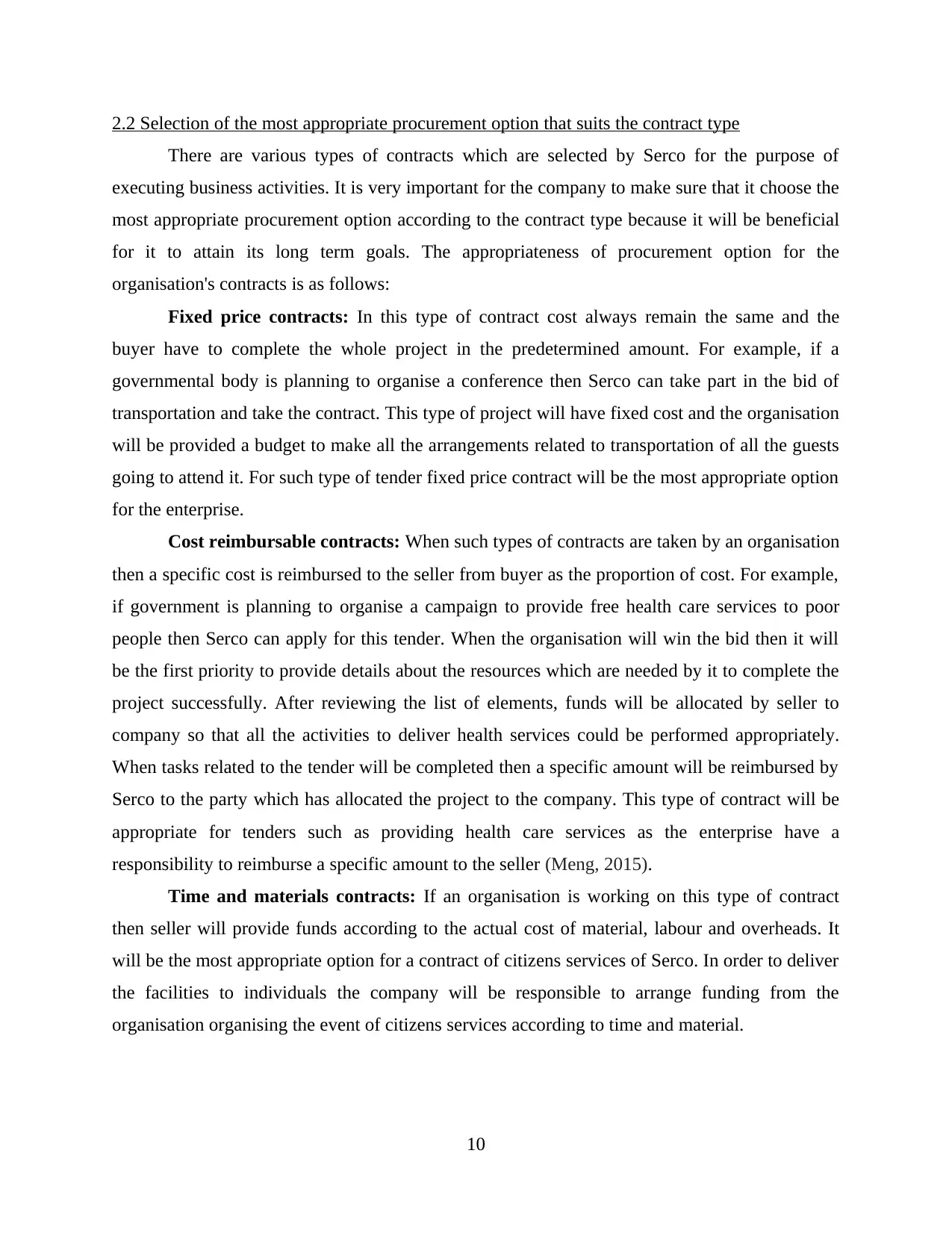
2.2 Selection of the most appropriate procurement option that suits the contract type
There are various types of contracts which are selected by Serco for the purpose of
executing business activities. It is very important for the company to make sure that it choose the
most appropriate procurement option according to the contract type because it will be beneficial
for it to attain its long term goals. The appropriateness of procurement option for the
organisation's contracts is as follows:
Fixed price contracts: In this type of contract cost always remain the same and the
buyer have to complete the whole project in the predetermined amount. For example, if a
governmental body is planning to organise a conference then Serco can take part in the bid of
transportation and take the contract. This type of project will have fixed cost and the organisation
will be provided a budget to make all the arrangements related to transportation of all the guests
going to attend it. For such type of tender fixed price contract will be the most appropriate option
for the enterprise.
Cost reimbursable contracts: When such types of contracts are taken by an organisation
then a specific cost is reimbursed to the seller from buyer as the proportion of cost. For example,
if government is planning to organise a campaign to provide free health care services to poor
people then Serco can apply for this tender. When the organisation will win the bid then it will
be the first priority to provide details about the resources which are needed by it to complete the
project successfully. After reviewing the list of elements, funds will be allocated by seller to
company so that all the activities to deliver health services could be performed appropriately.
When tasks related to the tender will be completed then a specific amount will be reimbursed by
Serco to the party which has allocated the project to the company. This type of contract will be
appropriate for tenders such as providing health care services as the enterprise have a
responsibility to reimburse a specific amount to the seller (Meng, 2015).
Time and materials contracts: If an organisation is working on this type of contract
then seller will provide funds according to the actual cost of material, labour and overheads. It
will be the most appropriate option for a contract of citizens services of Serco. In order to deliver
the facilities to individuals the company will be responsible to arrange funding from the
organisation organising the event of citizens services according to time and material.
10
There are various types of contracts which are selected by Serco for the purpose of
executing business activities. It is very important for the company to make sure that it choose the
most appropriate procurement option according to the contract type because it will be beneficial
for it to attain its long term goals. The appropriateness of procurement option for the
organisation's contracts is as follows:
Fixed price contracts: In this type of contract cost always remain the same and the
buyer have to complete the whole project in the predetermined amount. For example, if a
governmental body is planning to organise a conference then Serco can take part in the bid of
transportation and take the contract. This type of project will have fixed cost and the organisation
will be provided a budget to make all the arrangements related to transportation of all the guests
going to attend it. For such type of tender fixed price contract will be the most appropriate option
for the enterprise.
Cost reimbursable contracts: When such types of contracts are taken by an organisation
then a specific cost is reimbursed to the seller from buyer as the proportion of cost. For example,
if government is planning to organise a campaign to provide free health care services to poor
people then Serco can apply for this tender. When the organisation will win the bid then it will
be the first priority to provide details about the resources which are needed by it to complete the
project successfully. After reviewing the list of elements, funds will be allocated by seller to
company so that all the activities to deliver health services could be performed appropriately.
When tasks related to the tender will be completed then a specific amount will be reimbursed by
Serco to the party which has allocated the project to the company. This type of contract will be
appropriate for tenders such as providing health care services as the enterprise have a
responsibility to reimburse a specific amount to the seller (Meng, 2015).
Time and materials contracts: If an organisation is working on this type of contract
then seller will provide funds according to the actual cost of material, labour and overheads. It
will be the most appropriate option for a contract of citizens services of Serco. In order to deliver
the facilities to individuals the company will be responsible to arrange funding from the
organisation organising the event of citizens services according to time and material.
10
⊘ This is a preview!⊘
Do you want full access?
Subscribe today to unlock all pages.

Trusted by 1+ million students worldwide
1 out of 23
Related Documents
Your All-in-One AI-Powered Toolkit for Academic Success.
+13062052269
info@desklib.com
Available 24*7 on WhatsApp / Email
![[object Object]](/_next/static/media/star-bottom.7253800d.svg)
Unlock your academic potential
Copyright © 2020–2026 A2Z Services. All Rights Reserved. Developed and managed by ZUCOL.




